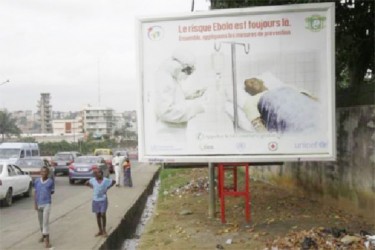LONDON/GENEVA, (Reuters) – The number of new Ebola cases in West Africa is growing faster than authorities can manage them, the World Health Organisation (WHO) said yesterday, renewing a call for health workers from around the world to go to the region to help.

As the death toll rose to more than 2,400 people out of 4,784 cases, WHO director general Margaret Chan told a news conference in Geneva the vast nature of the outbreak — particularly in the three hardest-hit countries of Guinea, Liberia and Sierra Leone — required a massive emergency response.
Sarah Crowe, a spokeswoman for UNICEF, said the U.N. children’s agency was using innovative ways to tackle the epidemic, including telling people to “use whatever means they have, such as plastic bags, to cover themselves if they have to deal with sick members of their family”.
“The Ebola treatment centres are full, there are only three in the country. Families need help in finding new ways to deal with this and deal with their loved ones and give them care without exposing themselves to this infection,” she said via phone from Monrovia.
“It is quite surreal and everywhere there is a sense of this virus taking over the whole country,” Crowe said. “We do not have enough partners on the ground. Many Liberians say they feel abandoned.”
Survivors of the disease, who are immune to reinfection, were being used to look after thousands of children of people with suspected Ebola. About 2,000 children have lost one or both parents in Liberia alone, she said.
The key to beating the disease, said the WHO’s Chan, was people power. Pledges of equipment and money are coming in, but 500-600 foreign experts and at least 1,000 local health workers are needed on the ground.
“The number of new patients is moving far faster than the capacity to manage them. We need to surge at least three to four times to catch up with the outbreaks,” Chan said.
Chan said the real death toll is probably far higher than the latest number of 2,400.
“We are very cognizant of the fact that any number of cases and deaths that we are reporting is an underestimate.” she said.
The Ebola infection rate and death toll have been particularly high among health workers, who are exposed to hundreds of highly infectious patients who can pass the virus on through body fluids such as blood and excrement.
Almost half of the 301 healthcare workers who have developed the disease have died.




